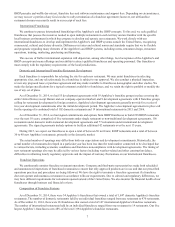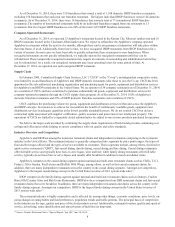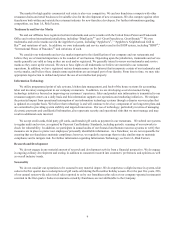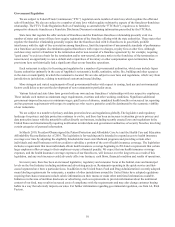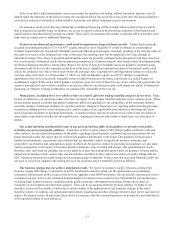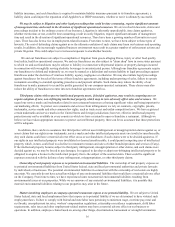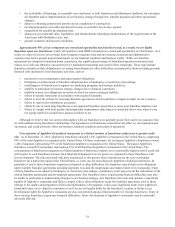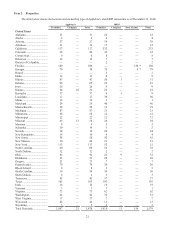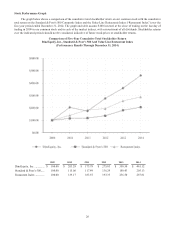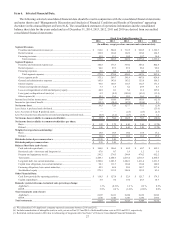IHOP 2014 Annual Report Download - page 36
Download and view the complete annual report
Please find page 36 of the 2014 IHOP annual report below. You can navigate through the pages in the report by either clicking on the pages listed below, or by using the keyword search tool below to find specific information within the annual report.17
may divert financial and management resources and adversely affect operations. The losses that may be incurred as a result of
any violation of such employment laws are difficult to quantify.
Our failure or the failure of our franchisees to comply with federal, state and local governmental regulations may
subject us to losses and harm our brands. We are subject to the Fair Labor Standards Act (which governs such matters as
minimum wages, overtime and other working conditions), along with the Americans with Disabilities Act, the Immigration
Reform and Control Act of 1986, various family leave mandates and a variety of other laws enacted, or rules and regulations
promulgated by federal, state and local governmental authorities that govern these and other employment matters, including tip
credits, working conditions, safety standards and immigration status. In 2014, the general counsel’s office of the National
Labor Relations Board issued complaints naming the McDonald’s Corporation as a joint employer of workers at its franchisees
for alleged violations of the Fair Labor Standards Act. There can be no assurance that other franchisors will not receive similar
complaints in the future which may result in legal proceedings based on the actions of its franchisees. We expect increases in
payroll expenses as a result of federal and state mandated increases in the minimum wage, and although such increases are not
expected to be material, we cannot assure you that there will not be material increases in the future. Enactment and
enforcement of various federal, state and local laws, rules and regulations on immigration and labor organizations may
adversely impact the availability and costs of labor for our restaurants in a particular area or across the United States. Other
labor shortages or increased team member turnover could also increase labor costs. In addition, our vendors may be affected by
higher minimum wage standards or availability of labor, which may increase the price of goods and services they supply to us.
We continue to evaluate the potential impact of the Patient Protection and Affordable Care Act and regulations issued thereto on
our business, and to accommodate various parts of the law as they take effect. There are no assurances that a combination of
cost management and price increases can accommodate all of the costs associated with compliance.
We are subject to extensive federal, state and local governmental regulations, including those relating to the food safety
and inspection and the preparation and sale of food and alcoholic beverages. Disruptions within any government agencies
could impact the U.S. food industry which may have an adverse effect on our business. We are also subject to laws and
regulations relating to building and zoning requirements. Each of our and our franchisees' restaurants is also subject to licensing
and regulation by alcoholic beverage control, health, sanitation, safety and fire agencies in the state, county and/or municipality
where the restaurant is located. We generally have not encountered any material difficulties or failures in obtaining and
maintaining the required licenses and approvals that could impact the continuing operations of an existing restaurant, or delay
or prevent the opening of a new restaurant. Although we do not, at this time, anticipate any occurring in the future, we cannot
assure you that we or our franchisees will not experience material difficulties or failures that could impact the continuing
operations of an existing restaurant, or delay the opening of restaurants in the future.
In addition, we are subject to laws and regulations, which vary from jurisdiction to jurisdiction, relating to nutritional
content and menu labeling. Compliance with these laws and regulations may lead to increased costs and operational complexity
and may increase our exposure to governmental investigations or litigation. In connection with the continued operation or
remodeling of certain restaurants, we or our franchisees may be required to expend funds to meet federal, state and local and
foreign regulations. The inability to obtain or maintain such licenses or publicity resulting from actual or alleged violations of
such laws could have an adverse effect on our results of operations.
Finally, we are subject to federal regulation and certain state laws which govern the offer and sale of franchises. Many state
franchise laws contain provisions that supersede the terms of franchise agreements, including provisions concerning the
termination or non-renewal of a franchise. Some state franchise laws require that certain materials be registered before
franchises can be offered or sold in that state. The failure to obtain or retain licenses or approvals to sell franchises could
adversely affect us and the franchisees. Changes in, and the cost of compliance with, government regulations could have a
material effect on operations.
Restaurant development plans under development agreements may not be implemented effectively. We rely on franchisees
to develop Applebee's and IHOP restaurants. Restaurant development and the success of restaurants opened by our franchisees
involve substantial risks, including the following:
• the demand for Applebee’s and IHOP restaurants and the selection of appropriate franchisee candidates;
• costs of construction, permit issuance and regulatory compliance;
• the availability of suitable locations and terms for potential development sites, including lease or purchase terms for
new locations;
• the ability of franchisees to fulfill their commitments to build new restaurants in the numbers and the time frames
specified in their development agreements;


